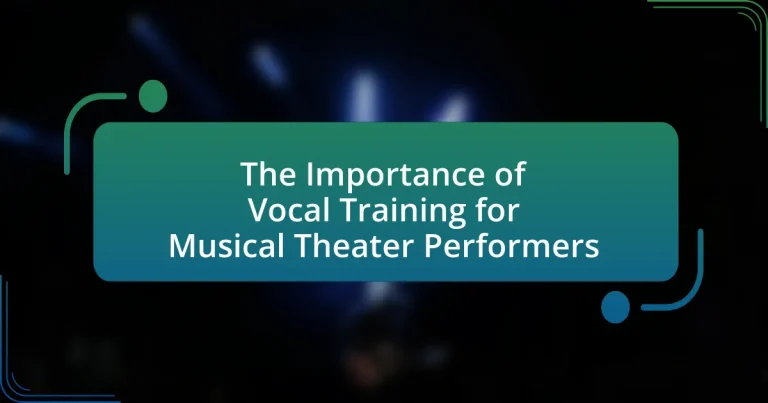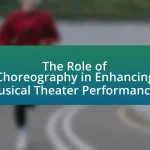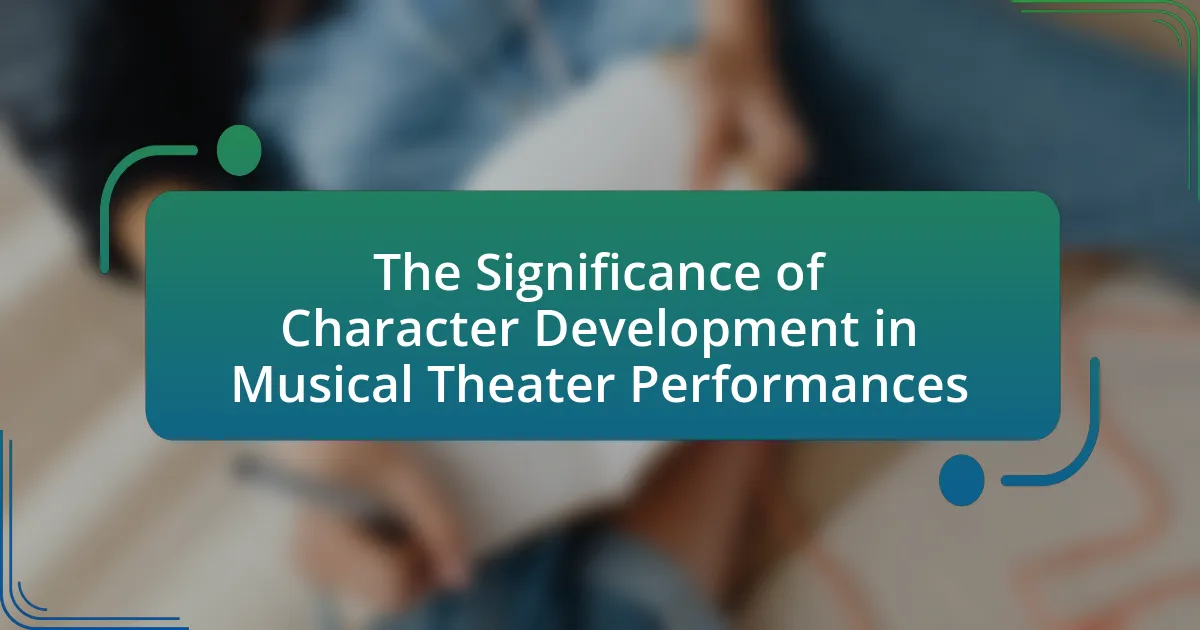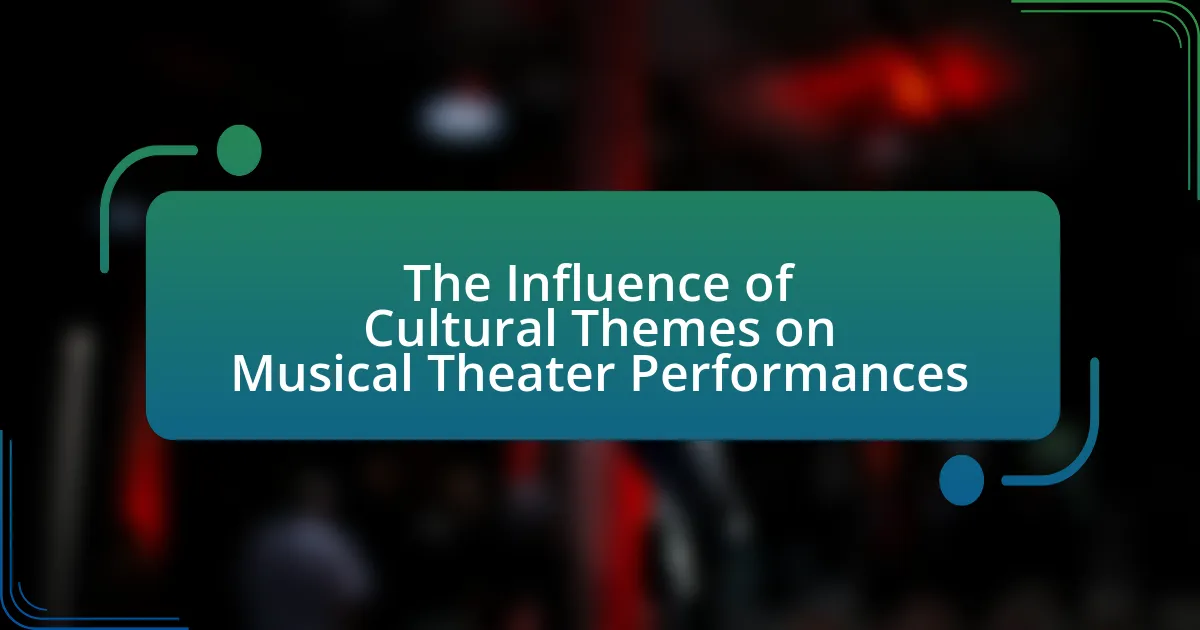Vocal training is essential for musical theater performers as it enhances vocal technique, projection, and overall vocal health. This training develops critical skills such as pitch control, breath support, and articulation, which are vital for delivering compelling performances. Research indicates that consistent vocal training improves vocal range and stamina, reducing the risk of strain and injury. Key components of effective vocal training include breath control, vocal exercises, and performance practice, all of which contribute to a performer’s versatility and ability to engage audiences. Additionally, vocal training significantly influences casting decisions and career opportunities within the competitive field of musical theater.
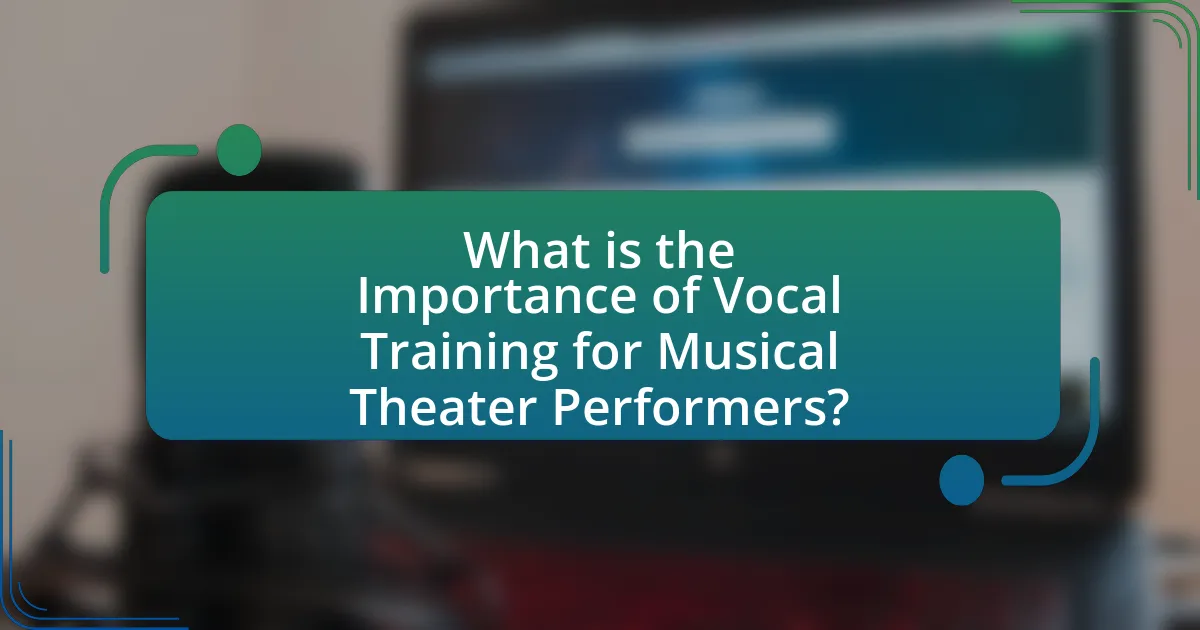
What is the Importance of Vocal Training for Musical Theater Performers?
Vocal training is crucial for musical theater performers as it enhances their vocal technique, enabling them to project their voices effectively and maintain vocal health. This training allows performers to master various singing styles, control their breath, and develop a strong stage presence. Research indicates that consistent vocal training can lead to improved vocal range and stamina, which are essential for the demanding nature of musical theater performances. For instance, a study published in the Journal of Voice highlights that trained singers exhibit greater vocal endurance and reduced risk of vocal strain compared to untrained individuals. Thus, vocal training not only improves performance quality but also safeguards the long-term health of a performer’s voice.
Why is vocal training essential for musical theater performers?
Vocal training is essential for musical theater performers because it enhances their vocal technique, enabling them to project their voices effectively and maintain vocal health during demanding performances. This training equips performers with the skills to control pitch, tone, and volume, which are crucial for conveying emotion and character in musical theater. Studies show that trained singers have a lower risk of vocal strain and injury, allowing them to perform consistently over long runs. Additionally, vocal training helps performers adapt to various musical styles, ensuring versatility and adaptability in diverse roles.
What specific skills does vocal training develop in performers?
Vocal training develops essential skills in performers, including pitch control, breath support, vocal range expansion, and articulation. These skills enable performers to deliver their lines and songs with clarity and emotional expression. For instance, pitch control allows singers to stay in tune, while breath support ensures they can sustain notes without strain. Research indicates that consistent vocal training can increase a performer’s vocal range by up to an octave, enhancing their versatility in musical theater. Additionally, improved articulation helps in delivering lyrics clearly, which is crucial for audience understanding and engagement.
How does vocal training enhance performance quality?
Vocal training enhances performance quality by improving vocal technique, control, and expression. This training allows performers to develop a stronger, more versatile voice, enabling them to project clearly and convey emotions effectively. Research indicates that consistent vocal exercises can increase vocal range and stamina, which are crucial for sustaining performances over time. For instance, a study published in the Journal of Voice found that singers who engaged in regular vocal training demonstrated significant improvements in pitch accuracy and vocal endurance compared to those who did not train. Thus, vocal training directly contributes to a performer’s ability to deliver compelling and polished performances.
What are the key components of effective vocal training?
The key components of effective vocal training include breath control, vocal technique, resonance, diction, and performance practice. Breath control is essential as it provides the foundation for sustaining notes and managing vocal power. Vocal technique encompasses exercises that improve pitch accuracy, tone quality, and vocal range. Resonance focuses on the amplification of sound through the vocal tract, enhancing the overall quality of the voice. Diction ensures clarity in pronunciation, which is crucial for communication in musical theater. Performance practice involves integrating vocal skills with acting and stage presence, allowing performers to convey emotion and connect with the audience. These components collectively contribute to a well-rounded vocal training regimen, essential for success in musical theater.
What techniques are commonly used in vocal training?
Common techniques used in vocal training include breath control, vocal exercises, resonance training, and diction practice. Breath control techniques, such as diaphragmatic breathing, help singers manage their airflow and sustain notes effectively. Vocal exercises, like scales and arpeggios, strengthen vocal cords and improve range. Resonance training focuses on optimizing sound production by adjusting vocal tract shape, enhancing projection and tone quality. Diction practice involves articulating words clearly to ensure lyrics are understood, which is crucial for musical theater performers. These techniques are foundational for developing a strong and versatile singing voice, essential for success in musical theater.
How do breathing exercises contribute to vocal training?
Breathing exercises significantly enhance vocal training by improving breath control, which is essential for sustained vocal performance. These exercises strengthen the diaphragm and intercostal muscles, allowing performers to manage their breath more effectively during singing or speaking. Research indicates that proper breath support leads to better vocal projection and tone quality, as evidenced by studies showing that singers who practice breath control techniques exhibit increased vocal range and stamina. Thus, integrating breathing exercises into vocal training is crucial for musical theater performers to achieve optimal vocal health and performance quality.
What challenges do musical theater performers face without vocal training?
Musical theater performers face significant challenges without vocal training, including limited vocal range, poor breath control, and increased risk of vocal strain. Limited vocal range restricts the ability to perform various roles, as many characters require specific vocal qualities. Poor breath control affects stamina and the ability to sustain notes, which is crucial for long performances. Additionally, without proper techniques, performers are more susceptible to vocal strain and injury, which can lead to career-threatening issues. Studies show that trained singers exhibit greater vocal health and versatility, underscoring the necessity of vocal training in this demanding field.
How can poor vocal technique impact a performance?
Poor vocal technique can significantly diminish a performance by affecting vocal quality, pitch accuracy, and stamina. When performers lack proper vocal training, they may struggle to project their voices, leading to weak sound that fails to engage the audience. Additionally, improper technique can result in pitch inaccuracies, causing dissonance with musical accompaniment, which detracts from the overall harmony of the performance. Research indicates that singers with inadequate vocal training are more prone to vocal strain and fatigue, limiting their ability to sustain long performances effectively. This can lead to a lack of emotional expression and connection with the audience, ultimately undermining the impact of the performance.
What health risks are associated with inadequate vocal training?
Inadequate vocal training can lead to several health risks, including vocal strain, nodules, and long-term damage to the vocal cords. Vocal strain occurs when performers push their voices beyond healthy limits, leading to pain and discomfort. Vocal nodules, often referred to as “singer’s nodules,” are callous-like growths that develop on the vocal cords due to excessive or improper use, which can result in a hoarse voice and difficulty in vocal range. Long-term damage to the vocal cords can manifest as chronic hoarseness or loss of voice, significantly impacting a performer’s ability to work. Research indicates that singers who do not receive proper training are at a higher risk for these conditions, emphasizing the necessity of vocal education to maintain vocal health.
How does vocal training influence a performer’s career?
Vocal training significantly enhances a performer’s career by improving their vocal technique, range, and overall performance quality. This training allows performers to deliver more powerful and controlled vocal performances, which can lead to greater opportunities in auditions and roles. Research indicates that trained singers exhibit better breath control and pitch accuracy, essential skills in musical theater, where vocal demands are high. For instance, a study published in the Journal of Voice found that singers who underwent structured vocal training showed a 30% improvement in vocal endurance and a 25% increase in range compared to untrained singers. Thus, vocal training not only elevates a performer’s skill set but also increases their marketability and success in the competitive field of musical theater.
What career opportunities are enhanced by vocal training?
Vocal training enhances career opportunities in fields such as musical theater, voice acting, public speaking, and broadcasting. In musical theater, trained vocalists can secure leading roles, as strong vocal skills are essential for performance quality and audience engagement. Voice acting requires precise vocal control and versatility, allowing trained individuals to excel in animation, video games, and commercials. Public speaking benefits from vocal training by improving clarity, projection, and audience connection, which are crucial for effective communication. Broadcasting professionals, including radio and television hosts, rely on vocal training to maintain listener engagement and convey information clearly. These career paths demonstrate that vocal training significantly increases employability and success in various performance and communication-oriented industries.
How does vocal training affect casting decisions in musical theater?
Vocal training significantly influences casting decisions in musical theater by enhancing a performer’s vocal ability, versatility, and overall stage presence. Casting directors prioritize trained voices that can meet the demands of various musical styles and vocal techniques required in productions. For instance, a study by the National Association of Schools of Theatre indicates that performers with formal vocal training are more likely to secure leading roles due to their ability to project, sustain notes, and convey emotion effectively. This training not only improves vocal quality but also instills confidence, making performers more appealing during auditions.
What role does vocal training play in a performer’s versatility?
Vocal training significantly enhances a performer’s versatility by developing their vocal range, control, and adaptability across various musical styles. This training allows performers to master different techniques, such as belting, head voice, and mixed voice, enabling them to switch seamlessly between genres like opera, pop, and musical theater. Research indicates that consistent vocal training can increase a singer’s range by up to an octave, which broadens their performance capabilities. Additionally, trained vocalists can better interpret and convey emotions through their singing, making them more dynamic and engaging on stage.
How can vocal training improve audience engagement?
Vocal training can significantly improve audience engagement by enhancing a performer’s vocal clarity, expressiveness, and emotional connection. When performers undergo vocal training, they learn techniques that allow them to project their voices effectively, articulate words clearly, and convey emotions through tone and dynamics. Research indicates that audiences are more likely to be captivated by performances where the vocal delivery is strong and expressive, as it fosters a deeper emotional connection. For instance, a study published in the Journal of Voice found that trained singers exhibit greater control over pitch and volume, which directly correlates with audience retention and engagement levels. Thus, vocal training equips performers with the skills necessary to engage their audience more effectively.
What techniques help performers connect with their audience through voice?
Techniques that help performers connect with their audience through voice include vocal modulation, emotional expression, and audience engagement strategies. Vocal modulation involves varying pitch, tone, and volume to convey different emotions and maintain audience interest. Emotional expression allows performers to authentically convey feelings, making the performance relatable and impactful. Audience engagement strategies, such as direct eye contact and interactive elements, foster a sense of connection and involvement, enhancing the overall experience. These techniques are supported by studies showing that emotional delivery and audience interaction significantly increase audience retention and enjoyment during performances.
How does vocal clarity impact audience perception?
Vocal clarity significantly enhances audience perception by ensuring that the message is understood and engaging. When performers articulate their words clearly, it allows the audience to grasp the narrative and emotional nuances of the performance, leading to a more immersive experience. Research indicates that clear vocal delivery can increase audience retention of information by up to 50%, as listeners are better able to follow the storyline and connect with characters. This connection is crucial in musical theater, where emotional expression and storytelling are paramount. Therefore, vocal clarity not only aids comprehension but also enriches the overall impact of the performance on the audience.
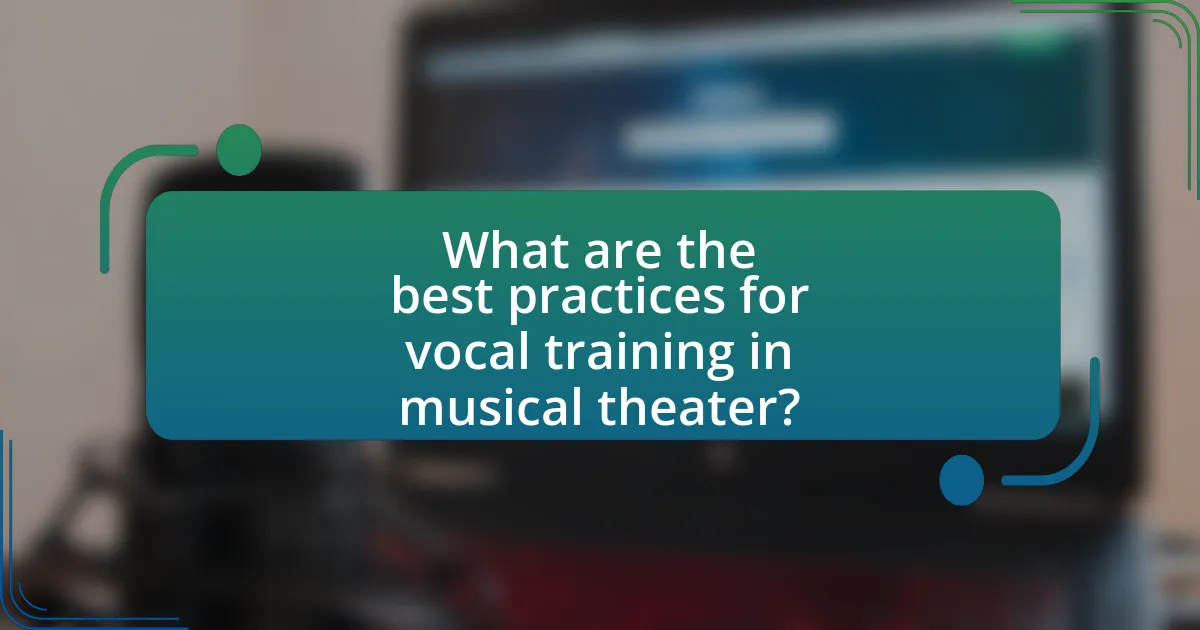
What are the best practices for vocal training in musical theater?
The best practices for vocal training in musical theater include consistent warm-ups, proper breath control, and vocal technique exercises. Consistent warm-ups, such as lip trills and sirens, prepare the voice for performance and help prevent strain. Proper breath control is essential for sustaining notes and delivering powerful performances; techniques like diaphragmatic breathing enhance vocal support. Additionally, vocal technique exercises, including scales and arpeggios, improve range and flexibility. Research indicates that structured vocal training can lead to significant improvements in vocal quality and stamina, as evidenced by studies conducted by the National Association of Teachers of Singing, which highlight the effectiveness of these practices in developing a healthy singing voice.
How can performers create an effective vocal training routine?
Performers can create an effective vocal training routine by incorporating consistent practice, targeted exercises, and proper vocal techniques. Consistency is crucial; daily practice helps build muscle memory and vocal strength. Targeted exercises should focus on breath control, pitch accuracy, and vocal range expansion. Techniques such as warm-ups, scales, and resonance exercises enhance vocal quality and prevent strain. Research indicates that structured vocal training improves performance outcomes, as seen in studies highlighting the correlation between regular practice and vocal health among singers.
What daily exercises should be included in a vocal training regimen?
Daily exercises in a vocal training regimen should include warm-ups, breath control exercises, vocal scales, and articulation drills. Warm-ups, such as lip trills and humming, prepare the vocal cords for singing by increasing blood flow and flexibility. Breath control exercises, like diaphragmatic breathing, enhance lung capacity and support sustained singing. Vocal scales, including major and minor scales, improve pitch accuracy and vocal range. Articulation drills, such as tongue twisters, enhance clarity and diction. These exercises are essential for developing a strong and versatile singing voice, as supported by vocal pedagogy research which emphasizes the importance of consistent practice for vocal health and performance quality.
How can performers track their vocal progress over time?
Performers can track their vocal progress over time by regularly recording their singing sessions and analyzing the recordings for improvements in pitch, tone, and technique. This method allows performers to objectively assess their vocal development, as they can compare past recordings to current ones, identifying specific areas of growth or needed improvement. Research indicates that self-assessment through recorded performances can enhance awareness of vocal changes and facilitate targeted practice, leading to more effective vocal training outcomes.
What resources are available for vocal training?
Resources available for vocal training include online courses, vocal coaches, instructional books, and mobile applications. Online platforms such as MasterClass and Udemy offer structured courses taught by experienced vocalists, while private vocal coaches provide personalized training tailored to individual needs. Instructional books like “The New Singing Teacher” by John H. McGowan offer comprehensive techniques and exercises. Additionally, mobile applications such as Smule and SingSharp provide interactive tools for practice and feedback. These resources collectively support the development of vocal skills essential for musical theater performers.
What types of vocal coaches should performers consider?
Performers should consider several types of vocal coaches, including classical, contemporary, and specialized coaches. Classical vocal coaches focus on techniques rooted in opera and art song, emphasizing breath control and vocal health. Contemporary vocal coaches cater to modern genres like pop, rock, and musical theater, often incorporating styles and techniques relevant to current trends. Specialized coaches may focus on specific areas such as belting, voice rehabilitation, or performance techniques, providing tailored guidance based on individual needs. Each type of coach offers unique expertise that can enhance a performer’s vocal abilities and overall performance quality.
How can online resources enhance vocal training?
Online resources can enhance vocal training by providing access to a wide range of instructional materials, including video tutorials, vocal exercises, and expert feedback. These resources allow performers to practice at their own pace and receive guidance from experienced vocal coaches, which is crucial for developing proper technique and vocal health. For instance, platforms like YouTube offer countless tutorials from professional singers and educators, enabling users to learn various styles and techniques. Additionally, apps designed for vocal training often include features like pitch tracking and personalized exercises, which can help users monitor their progress and improve their skills effectively.
What tips can help performers maximize their vocal training?
Performers can maximize their vocal training by incorporating consistent practice, proper vocal warm-ups, and hydration into their routines. Consistent practice helps build muscle memory and vocal strength, while proper warm-ups prepare the vocal cords for demanding performances, reducing the risk of strain. Hydration is crucial as it keeps the vocal cords lubricated, enhancing vocal quality and endurance. Research indicates that singers who engage in regular vocal exercises show significant improvements in vocal range and control, underscoring the importance of these practices in vocal training.
